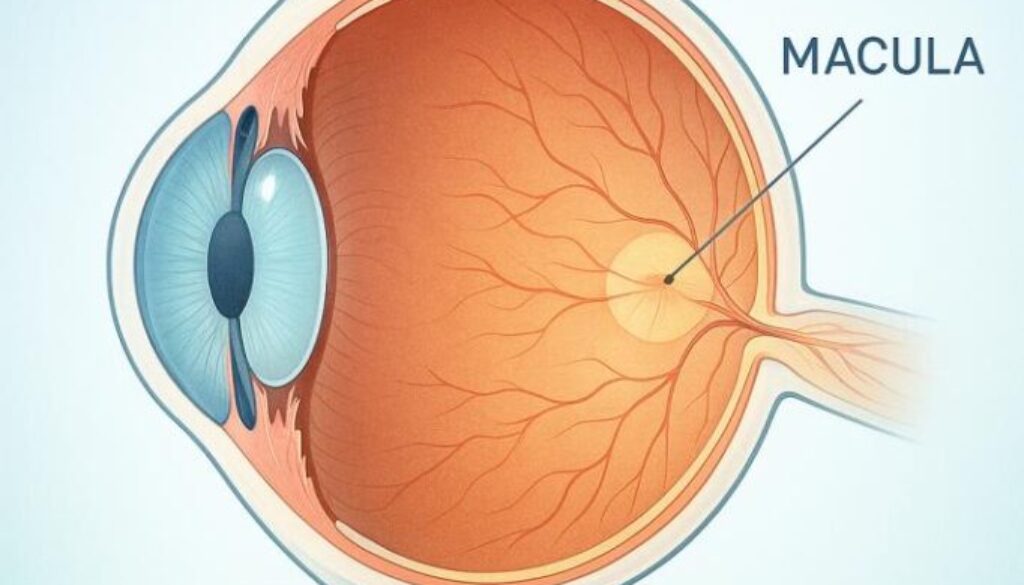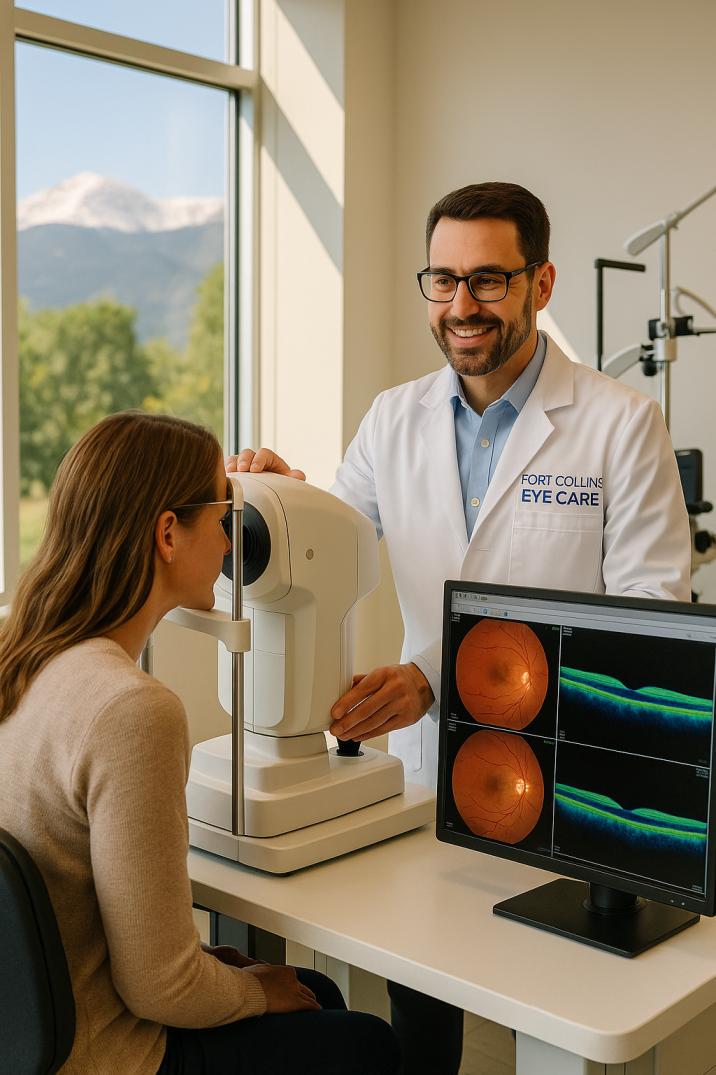Macular Degeneration: Treatment & Medicare Coverage
At a Glance: Nearly 20 million Americans live with macular degeneration, including 18.3 million with early-stage and 1.49 million with advanced disease. As the leading cause of vision loss in adults over 50, this progressive eye condition requires prompt attention—but there’s hope. Fort Collins residents benefit from exceptional eye care, with experienced specialists offering cutting-edge treatments, comprehensive Medicare coverage, and the latest research-backed therapies right here in Northern Colorado.
Understanding Macular Degeneration
Age-related macular degeneration (AMD) affects the macula—the central portion of your retina responsible for sharp, detailed vision. This progressive condition gradually impairs your ability to see fine details clearly, impacting everyday activities like reading, driving, and recognizing faces.
The encouraging news: Macular degeneration rarely leads to complete blindness. Your peripheral vision typically remains intact, helping you maintain independence even as the condition progresses.
Understanding the Two Types of Macular Degeneration
Dry Macular Degeneration (Atrophic AMD)
Representing approximately 90% of all cases, dry AMD develops when yellow protein deposits called drusen accumulate beneath the macula. This form typically progresses slowly over several years through three distinct stages:
- Early Stage: No noticeable symptoms, though changes are detectable during professional eye examinations
- Intermediate Stage: Mild visual disturbances, including slight blurriness or difficulty with low-light vision
- Advanced Stage: Significant central vision impairment occurs
Wet Macular Degeneration (Neovascular AMD)
Though affecting only 10% of patients, wet AMD presents a more urgent concern. This form occurs when abnormal blood vessels develop under the retina, leaking blood and fluid that can cause rapid vision deterioration. Wet AMD always represents an advanced stage requiring immediate medical intervention.
Recognizing Early Warning Signs: When to Consult Your Fort Collins Eye Specialist
Early detection remains crucial, as macular degeneration often develops without obvious symptoms in its initial stages. Monitor for these key indicators:
Initial Warning Signs
- Progressive blurriness in central vision
- Difficulty with low-light conditions
- Diminished color brightness and vibrancy
- Increased need for bright lighting when reading
Advanced Indicators
- Metamorphopsia: Straight lines appearing wavy or distorted (critical warning sign)
- Central scotomas: Dark or blank areas in your visual field
- Severe impairment in reading, driving, or facial recognition
- Sudden onset of visual changes
Important: If you observe straight lines appearing wavy or bent, contact your eye care provider immediately. This symptom often signals progression to wet AMD, which demands urgent treatment.
Risk Factors for Macular Degeneration
Understanding your personal risk profile helps guide preventive measures and screening schedules:
Primary Risk Factors
- Age: Prevalence increases significantly after age 55
- Genetics: Family history substantially elevates risk
- Ethnicity: Higher incidence rates in Caucasian populations
- Smoking: Current and former smokers face a two-to-three times greater risk
Modifiable Risk Factors
- Hypertension and cardiovascular disease
- Elevated cholesterol levels
- Prolonged ultraviolet light exposure
- Nutritional deficiencies in antioxidants
- Obesity and a sedentary lifestyle
Comprehensive Diagnostic Services in Fort Collins
Regular comprehensive eye examinations provide the most effective defense against vision loss from macular degeneration. Fort Collins eye care specialists employ advanced diagnostic technologies for early AMD detection:
Standard Examination Components
- Visual acuity assessments measuring central vision clarity
- Dilated fundus examinations for comprehensive retinal evaluation
- Amsler grid testing to identify visual field distortions
- Optical coherence tomography (OCT) provides detailed macular cross-sections
Advanced Imaging Techniques
- Fluorescein angiography to evaluate retinal blood vessel integrity
- Fundus autofluorescence detects metabolic changes in retinal cells
- Digital retinal photography documenting disease progression over time
Fort Collins residents benefit from state-of-the-art diagnostic equipment available through local eye care centers, ensuring precise early detection and optimal disease monitoring.
Treatment Options Available in Fort Collins
While there’s no cure for macular degeneration, several effective treatments can slow progression and preserve vision.
Dry AMD Treatment
Evidence-Based Nutritional Supplements
Recent clinical research from 2024-2025 reaffirms that AREDS2 supplements remain the gold standard for slowing dry AMD progression. The evidence-based formulation includes:
- Vitamin C: 500mg (ascorbic acid)
- Vitamin E: 400 IU (alpha-tocopherol)
- Lutein: 10mg (macular carotenoid)
- Zeaxanthin: 2mg (macular carotenoid)
- Zinc: 80mg (zinc oxide)
- Copper: 2mg (cupric oxide)
Clinical Evidence: Landmark 2024 research demonstrates that AREDS2 supplementation can reduce geographic atrophy progression by up to 55% over three years, particularly benefiting patients with foveal-sparing disease patterns. The recommended dosage is one soft gel twice daily with meals.
Lifestyle Modifications
- Mediterranean diet is rich in leafy greens and fish
- Regular exercise
- Smoking cessation
- UV protection with quality sunglasses
- Blood pressure management
Wet AMD Treatment
Anti-VEGF Injection Therapy
Fort Collins retinal specialists provide access to the most advanced injection therapies available:
- Bevacizumab (Avastin): Cost-effective option with proven efficacy
- Ranibizumab (Lucentis): FDA-approved specifically for AMD treatment
- Aflibercept (Eylea): Extended dosing intervals for patient convenience
These medications target vascular endothelial growth factor (VEGF), effectively halting abnormal blood vessel growth and preventing further vision deterioration.
Photodynamic Therapy (PDT)
For select cases, laser treatment combined with light-activated drugs can help seal leaking blood vessels.
Living Successfully with Macular Degeneration in Fort Collins
Vision Aids and Support
- High-contrast reading materials
- Magnifying devices
- Improved lighting solutions
- Low-vision rehabilitation programs
Local Resources
Fort Collins offers excellent support services for those with vision loss, including:
- Transportation assistance programs
- Support groups through local organizations
- Adaptive technology training
- Home safety evaluations
Prevention Strategies: Protecting Your Vision
Research demonstrates that lifestyle modifications can significantly reduce AMD risk and slow disease progression:
Nutritional Optimization
Emphasize foods rich in macular-protective nutrients:
- Leafy greens: Spinach, kale, and collard greens (high in lutein and zeaxanthin)
- Colorful vegetables: Carrots, bell peppers, and corn (beta-carotene sources)
- Omega-3 fatty fish: Salmon, mackerel, and sardines (anti-inflammatory effects)
- Nuts and seeds: Almonds, walnuts, and sunflower seeds (vitamin E sources)
Lifestyle Modifications
- Maintain a healthy body weight and regular physical activity
- Complete smoking cessation (the most modifiable risk factor)
- Comprehensive UV protection with quality sunglasses
- Optimal management of cardiovascular risk factors
Fort Collins Eye Care Providers: Your Partners in Vision Health
Northern Colorado residents have access to exceptional eye care from experienced providers who understand the local community’s needs. When choosing your eye care team, look for:
Key Qualifications
- Board certification in ophthalmology or optometry
- Experience treating macular degeneration
- Access to advanced diagnostic equipment
- Comprehensive treatment options
- Medicare and insurance acceptance
What to Expect During Your Visit
- Thorough medical history review
- Complete eye examination
- Discussion of family history and risk factors
- Personalized treatment recommendations
- Clear explanation of your condition and options
The Importance of Regular Monitoring
Macular degeneration requires ongoing care to preserve your vision effectively. Your Fort Collins eye doctor will typically recommend:
Follow-up Schedule
- Early AMD: Annual comprehensive exams
- Intermediate AMD: Every 6-12 months
- Advanced AMD: Every 3-6 months or as needed
Home Monitoring
Many patients benefit from daily vision checks using an Amsler grid—a simple tool that helps detect changes between appointments.
Recent Scientific Advances: Hope for the Future
Exciting developments in macular degeneration research offer hope for better treatments:
Current Research Highlights
-
Enhanced AREDS2 Efficacy (2024): A new analysis confirms that supplements slow progression, even in late-stage disease, with geographic atrophy expansion reduced by 55% over three years.
-
Stem Cell Therapy Advances (2024): Clinical trials show promising results for retinal cell replacement, though treatments remain experimental.
-
Gene Therapy Developments (2025): Innovative approaches targeting genetic causes of AMD show early promise in preventing disease onset.
Insurance Coverage and Financial Considerations
Understanding your insurance benefits ensures access to necessary care while managing costs effectively:
Medicare Coverage
- Part B covers diagnostic exams for high-risk patients (after meeting the $257 deductible in 2025)
- Anti-VEGF injections are typically covered for wet AMD
- AREDS2 supplements are usually not covered, but remain affordable over-the-counter
Private Insurance
Most major insurance plans cover:
- Annual eye exams for those over 50
- Diagnostic testing when medically necessary
- FDA-approved treatments for wet AMD
Your Next Steps: Taking Action for Vision Health
Proactive vision care makes the crucial difference in preserving sight and maintaining independence.
Scheduling Your Comprehensive Examination
If you’re over 50, have a family history of macular degeneration, or notice visual changes, contact a qualified Fort Collins eye care specialist. Leading practices provide:
- Urgent care availability: Same-day appointments for concerning symptoms
- Insurance acceptance: Medicare and major insurance plans are welcome
- Advanced diagnostics: State-of-the-art imaging and testing equipment
- Comprehensive treatment: Complete spectrum of AMD management options
Prepare for Your Appointment
- List current medications and supplements
- Bring insurance cards and photo ID
- Write down any vision concerns or changes
- Prepare questions about your risk factors
Conclusion: Preserving Vision Through Expert Care in Fort Collins
Macular degeneration need not compromise your independence or quality of life. Through comprehensive care from Fort Collins eye specialists, evidence-based early detection protocols, and proven treatment interventions, you can effectively manage this condition while maintaining the activities you value most.
Take action today: Contact a Fort Collins eye care specialist to schedule your comprehensive vision examination and begin protecting your sight for the future.
Sources and Additional Resources
This article is based on current medical research and the recommendations of authoritative health organizations. For additional information, consult these trusted sources:
Scientific Research and Clinical Studies
-
National Eye Institute – AREDS2 Clinical Trials: Comprehensive information about the Age-Related Eye Disease Studies and supplement recommendations. nei.nih.gov/research/clinical-trials/age-related-eye-disease-studies-aredsareds2
-
CDC Vision and Eye Health Surveillance System: Latest prevalence data and statistics on macular degeneration in the United States. cdc.gov/vision-health-data/prevalence-estimates/amd-prevalence.html
-
BrightFocus Foundation – Macular Degeneration Research: Current research findings and breakthrough studies on AMD treatment and prevention. brightfocus.org/macular/facts-figures
Medicare Coverage Information
For current Medicare benefits and coverage details for eye care, visit: medicare.gov/coverage/eye-exams-routine
FAQs
-
Macular degeneration is a condition causing central vision loss, mainly in people over 50 or with a family history
Please note: None of the above should be considered medical advice. If you’re having any concerns about your vision, please reach out to us immediately or see your primary care provider.




